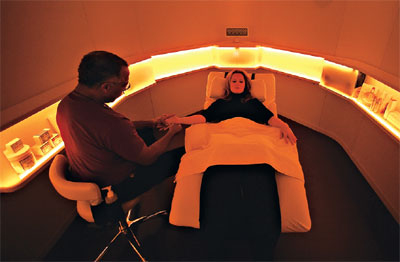▶ In some places, an acceptance for sleeping on the job.
There is no rest for the weary these days, at least if the number of spas offering sleep treatments is any indication. Yelo Spa in Manhattan.
Professional basketball players in the National Basketball Association like LeBron James, Grant Hill and Steve Nash swear by their pregame nap, saying it is refreshing and gets them ready for competition. Players who get nine hours of sleep are more likely to react quicker and remember plays better, according to Dr. Charles Czeisler, the director of the Division of Sleep Medicine at Harvard Medical School.
“If you were in the corporate world, you’d love to take a nap,” Jason Kapono of the Philadelphia 76ers told The Times. “So why wouldn’t you, if you could?”
Most likely because for everyone else in America - unlike in hot countries and Mediterranean climes that have a siesta or reposo -to doze is often considered unproductive or lazy. But napping may be losing its stigma as more pay heed to research showing that naps can correct midday slumps by enhancing alertness, productivity, memory and mood. A British study found that anticipating a nap is enough to lower blood pressure, and research in Greece concluded that napping lowers the risk of heart attack and stroke , The Times reported.
Companies have turned to the 20-minute power nap as a way to stave off billions in lost productivity each year. And why not if there are already workplace perks like gyms, child-care facilities, lactation rooms, video games and pet-friendly offices? Workers at Nike have a nap-friendly “quiet room”; Google has futuristic napping pods and Jawa, a mobiletechnology company in Arizona, has two resting rooms, according to Bloomberg Businessweek. After air traffic controllers in America were caught napping on duty, the Federal Aviation Administration in April changed its scheduling to combat excessive sleepiness. In Germany and Japan, air traffic controllers retreat to quiet rooms with cots for night naps.
Bright lights and coffee can ward off sleepiness. But Gregory Belenky of the Sleep and Performance Research Center at Washington State University, Spokane, told The Times: “Unless you’re doing work that doesn’t require much thought, you are trading time awake at the expense of performance.”
Sleep has become the new bottled water. Although it can be had free, it is increasingly being marketed as an amenity, wrote The Times. Yelo, a salon in Manhattan, sells anxious New Yorkers the promise of a brief but cocooning sleep in a private chamber (starting at $17 for 20 minutes). MetroNaps sells or rents its napping chair, the EnergyPod, to companies like Google and Cisco Systems. Sleep health is also becoming a growing province of the luxury spa industry, as more spas offer treatments that include nighttime pampering and sleep medicine, reported The Times. Cucumba salon in London offers massages along with a nap in its Snooze- Booth.
To help them sleep better, consumers buy pillowtop mattresses and white-noise machines. Now, melatonin is an ingredient in a half-dozen baked goods that mimic the soothing effects of hash brownies, wrote The Times. Called Lazy Cakes, Kush Cakes and Lulla Pies, these products, which contain 8 milligrams of melatonin, sell for $3 to $4 as a way to promote relaxation.
In a stressed-out and medicated world, the weary often expect a remedy. As Jessie Gruman, the president of the Center for the Advancement of Health in Washington, told The Times: “You can buy sexual arousal, a new shape for your face, a skinnier silhouette, so why shouldn’t you be able to buy sleep?”
ANITA PATIL

